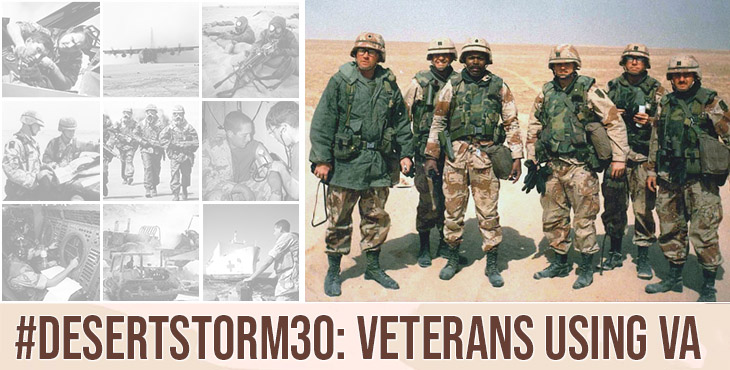During Operations Desert Shield and Desert Storm, over 695,000 service members deployed, while 2.2 million served during the war. As of 2019, there were nearly 5 million living Veterans of that era, of whom 2.7 million served exclusively during the Pre-9/11 time period.
VA provides dozens of benefits and services to Veterans of that era, and those benefits can be grouped into eight programs. Below is a look at how those Veterans have accessed VA services, along with charts showing the usage provided by the National Center for Veterans Analysis and Statistics.
The Veterans covered include any who served between the beginning of Operation Desert Shield, Aug. 2, 1990, and Sept. 10, 2001. It includes service members from this period who may also have served in other eras.
Totals
The total number of users has steadily grown. In fiscal year 2010, 2.13 million Veterans from this era used VA benefits. By fiscal 2019, that number increased to 2.79 million users.
In 2019 about 2.8 million Pre-9/11 Gulf War Veterans participated in at least one program, and 72.6% of the cohort had participated in at least one program since 2006. However, considering the living cohort consisted of nearly 5 million Veterans, this means that up to 1.4 million (27.4%) had not received any VA benefits or services. Learn more about benefits and services at the following links: Veterans Benefits Administration – Veterans Health Administration – National Cemetery Administration
Disability compensation
Disability compensation is a tax-free, monetary benefit paid to Veterans with disabilities that are the result of a disease or injury incurred or aggravated during active military service. Veterans may also receive compensation for post-service disabilities if considered related or secondary to disabilities occurring in service. Additionally, Veterans can receive compensation for disabilities presumed to be related to circumstances of military service, even if the disabilities arise after service.
This benefit has the largest number of users. Veterans from this era receiving disability compensation has grown from 1.14 million users in 2010 to 1.84 million users in 2019.
Health care
With VA health care, Veterans are covered for regular checkups with a primary care provider and appointments with specialists (like cardiologists, gynecologists, and mental health providers). They can also receive hospital inpatient care, including surgeries. Veterans can access health care services like home health and geriatric (elder) care. They can also get medical equipment, prosthetics and prescriptions.
Desert Storm Veterans use health care the second most of the benefits. Veterans from this era using VA health care has grown from 855,968 users in 2010 to 1.45 million in 2019.
Home loan guaranty
VA home loans are provided by private lenders, such as banks and mortgage companies. Veterans get more favorable terms from a lender because VA guarantees a portion of the loan.
Veterans from this era using VA home loan guaranty services has grown from 797,484 users in 2010 to just under 1.4 million users in 2019.
Life insurance
Veterans have access to life insurance benefits. VA’s life insurance programs provide financial security to Veterans and their families given the extraordinary risks involved in military service.
Veterans from this era using life insurance has slightly decreased from 340,090 users in 2010 to 323,021 users in 2019.
Education
Veterans can receive benefits to pay for college, graduate school, vocational training, technology classes. Additionally, they can get benefits for on-the-job training, apprenticeships and many more educational pursuits. Once a Veteran is deemed eligible, there’s a variety of training available.
Veterans from this era using education benefits has decreased from 274,418 users in 2010 to 120,770 users in 2019.
Vocational rehabilitation
Veterans may receive Veteran Readiness and Employment, which was formerly known as Vocational Rehabilitation and Employment (VR&E, “VocRehab”). These services help with job training, employment accommodations, resume development, and job seeking skills coaching. Veterans and service members may receive services in starting their own businesses. The program also can provide independent living services for those severely disabled and unable to work in traditional employment.
Veterans from this era using this benefit has decreased from 75,326 users in 2010 to 50,782 users in 2019.
Pension
VA helps Veterans and their families cope with financial challenges by providing supplemental income through the Veterans Pension and Survivors Pension benefit programs.
Veterans from this era receiving pension has grown from 10,223 users in 2010 to 17,298 users in 2019.
Memorial benefits
Veterans and their family members can get help through VA to plan and pay for a burial or memorial service in a VA national cemetery. Family members can also order memorial items to honor the service of a Veteran.
Veterans and families from this era using memorial benefits has grown from 6,372 users in 2010 to 10,840 users in 2019.
Percentages
In 2006 VA began tracking the number and percentage of Veterans who had participated in each program that year or beyond. This chart shows the percentages of living Pre-9/11 Gulf War Era Veterans who had participated in each program since 2006, by fiscal year. Education benefits data are not in this chart. Education benefits often occurred years prior to 2006 when the National Center for Veterans Analysis and Statistics began tracking past usage. Eligibility ends 15 years after military separation for Veterans whose service ended prior to Jan. 1, 2013, which is the case for many Veterans in this cohort.
Learn more
Want to see more Veterans statistics? View the National Center for Veterans Analysis and Statistics website.
Topics in this story
More Stories
In this news post, we explore the various options designed to keep you in your home, offering hope and possible solutions for when/if you experience financial hardship.
Summer Sports Clinic is a rehabilitative and educational sporting event for eligible Veterans with a range of disabilities.
Report examines the input of over 7,000 women Veterans: They are happier with VA health care than ever before.







I need the connection site for my video on demand appointment tomorrow morning.
What about Vietnam VETS or is that forgotten now?????